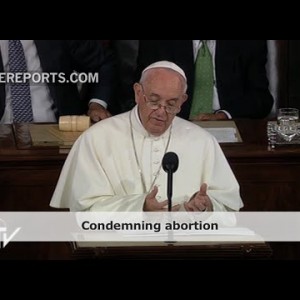
If families can say these three things, they will be fine: “sorry,” “excuse me,” “thank you.” I love these words of Pope Francis, offered during an October 2013 homily. Is it not a perfect example of the elementary yet profound wisdom the world has come to expect from the mouth and hands of our Holy Father? Sorry, excuse me, thank you—how hard can it be to practice those good manners, especially when it comes to our nearest and presumably dearest family members?
Apparently, very hard. The impeccable manners we display to the general public may be all but forgotten in the privacy of our home or wherever we encounter family. Even if we manage our manners under our own roof, it’s hard to ignore that society at large seems to be ushering them into the good-riddance past. Nowadays, sharing is less appealing than having and doing what I want. The courtship ritual, with its exchange of charm and respect, has devolved into the meaningless hook-up culture. Thinking before speaking—who has the time or patience? The courtesy of responding to a phone call, letter, email, or text message—particularly with any sensitivity or thoughtfulness—is all but dead. And anyway, OMG-LOL, what does RSVP even mean?
Sorry requires awareness that I am not perfect and might actually be wrong about something, despite feeling misunderstood or hurt myself. Saying “I’m sorry” takes more humility than I can muster some days, especially if I suspect that the relative I hurt will gloat at my failure or punish me by rejecting my apology. Still, since my Catholic faith revolves around the power and promise of forgiveness, I know that scorn and rejection are risks I must take.
Excuse me requires awareness that I am not the center of the universe; or at least that I may not be alone in a given space. If I’m not alone, shouldn’t I acknowledge others, manage my impulses, and strive to harmonize our activities? If I collide with a relative in the kitchen or on the stairs, is he or she less worthy of “excuse me” than the co-worker or stranger? If a door is closed (and not by a mischievous toddler), I might consider that it was closed for a reason and knock first to announce my presence. If I’m visiting with relatives in their home or mine, is it not common courtesy to identify our roles as guest or host and conduct ourselves accordingly?
Thank you requires awareness that respecting our relatives as fellow human beings trumps our rank in the family tree and whatever we mutually “owe” one another as family members. The relatives in our lives are under no more obligation than anyone else to give or exchange gifts of any kind for birthdays, holidays, or other special occasions; but whether I am the giver or the recipient, is not a “thank you” of even the simplest nature due? Likewise, being part of a household has built-in responsibilities, but that doesn’t mean I withhold praise or gratitude when a job is well done—or, well, just done.
Dear Family, I’m sorry when I forget to say “excuse me” for my trespasses. Thank you for the gift of your forgiveness!














